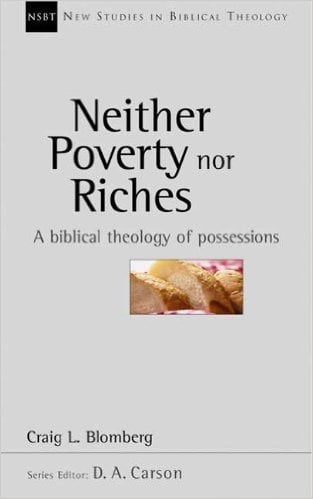⏱️ Estimated Reading Time: 4 min read
I’m (very slowly) working my way through InterVarsity’s New Studies in Biblical Theology series. As I was scanning some of the titles available, I came across a volume from Craig Blomberg. Naturally, I went straight to the endorsements. I saw D.A. Carson, the series editor and a prolific pastor and writer himself, who remarked that this book is “the best one on the subject” (9). That was enough to pick it up.
Neither Poverty Nor Riches is a slow, deep wade through Scripture and everything it has to say on the issues of money, finance, possessions, and wealth. One angle of Carson’s endorsement, and of mine, is that it is likely the most in-depth look at this topic out there, with over 240 pages of material. The first half is focused more on the Old Testament and historical implications, with the last half devoting lots of time to Jesus, Paul, and the New Testament church. At times, I felt like I had done a simple concordance search of the word “money,” and investigated the thousands of results in Scripture. This book opened my eyes to just how prevalent the issue of money is. It is permeated throughout the Bible more than I think we see at first glance.
Another great strength of Blomberg’s volume is just how well-researched it is. The bibliography is 37 pages long, which is not a list of footnotes, but only the citations and sources are used. Clearly, Blomberg is not just using his own exegetical insights and study, but pulling from literally hundreds of voices to build his points and cases throughout his book.
One of the main theses of Blomberg’s volume, indicated by the title, is how Scripture points to a “middle way” with our money and possessions. “Extreme wealth and extreme poverty both appear undesirable.” (56) Another is that “Judaism had a God who cared passionately about the poor and marginalized and opposed both religious idolatry and social injustice.” (110) Blomberg ultimately puts a heavy indictment on the Church’s unquestioned responsibility to care for those in need:
If most affluent Western Christians were, to be honest about the extent of their surplus, they would give considerably higher than 10% to Christian causes. And given the paltry percentages of most church budgets that help the materially needy, locally or globally, they would make sure that a substantial percentage of their giving went directly to individuals and organizations that offer holistic salvation of body and spirit to the desperately poor throughout the world…The bottom line is surely one of attitude. Does a discussion of issues like these threaten us, leading to counter-charges about guilt manipulation or to rationalizing our greeds as if they were our needs? Or are we convicted in a healthy way that leads us to ask what more we can do to divest ourselves of our unused or unnecessary possessions, to make budgets to see where money is really going, to exercise self-control and delayed gratification out of thanksgiving for all that God has blessed us what that we never deserved? (199, 252)
Blomberg even shares his own personal journey with his finances, the mistakes he and his family made in managing their money as a means of glorifying God, and how they’re trying to live right with their money. I appreciate his candor and honesty. It provoked me to talk honestly about my money when given the opportunity.
Apart from a few things I didn’t like about the book, Carson was right about this resource. I wish there had been an index for Scripture, or at least for subjects, but there is only an author’s index for reference. I also wish Blomberg would have spent a little more time on the implications and the applications of this exegetical treatment. Nonetheless, this book, though called “dry” by some, is a rich investigation of Scripture’s stance on money and has much to teach us in this important area.




